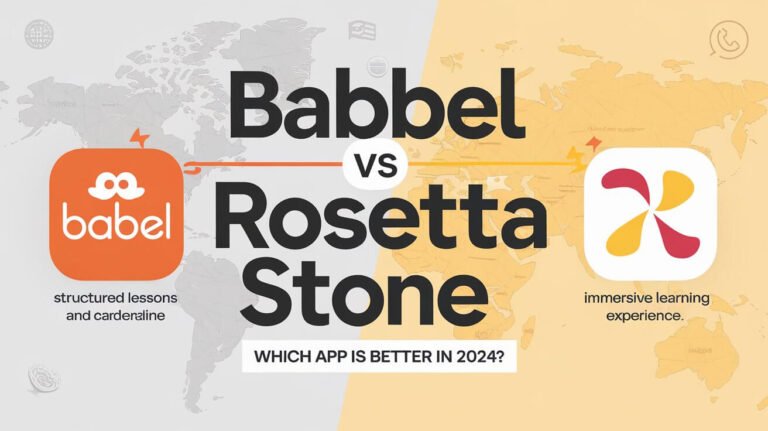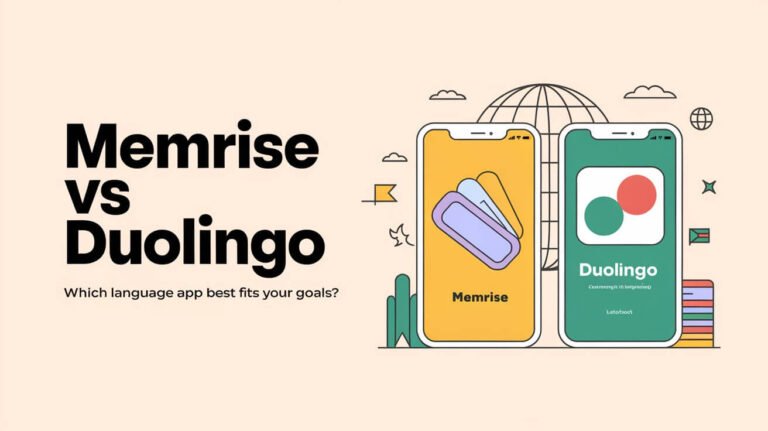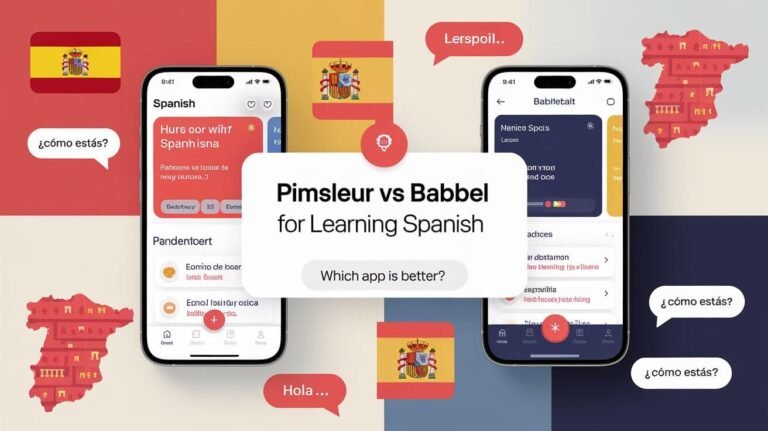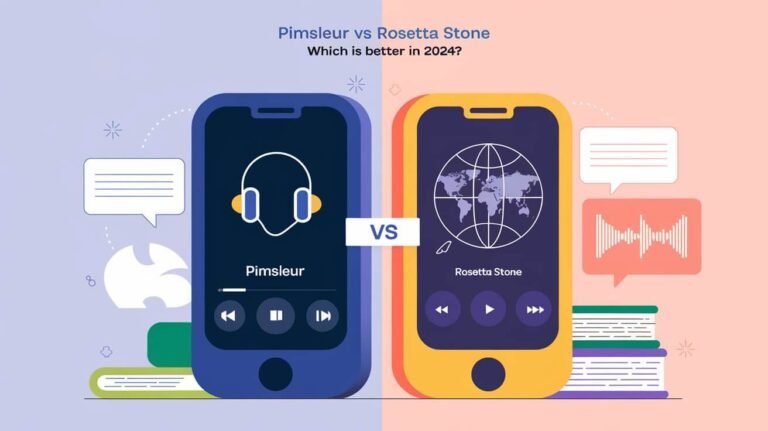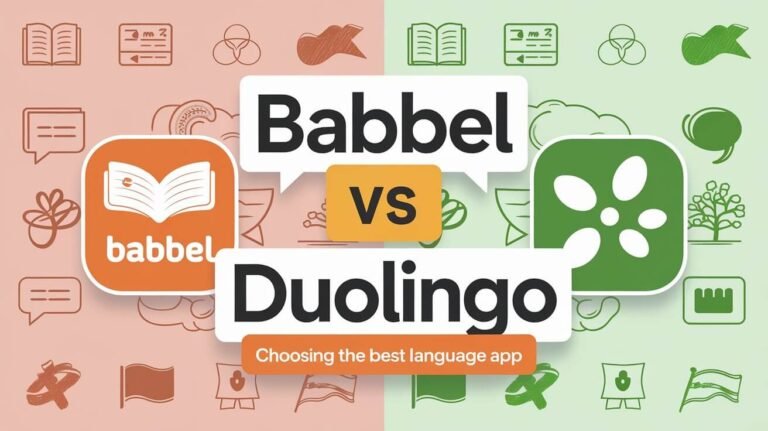Duolingo Vs Babbel Vs Rosetta Stone: Language Apps Comparison
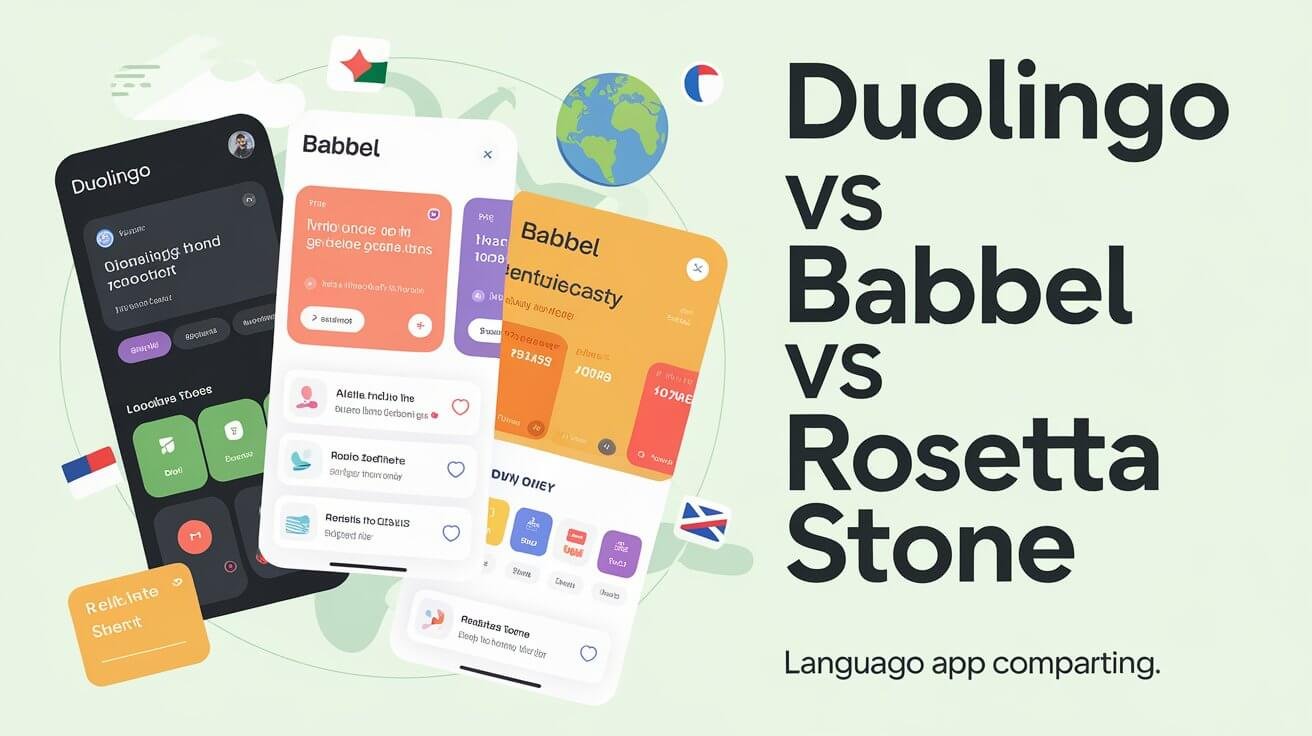
In the world of language learning, Duolingo, Babbel, and Rosetta Stone stand out. Each app has its own way of teaching new languages. They meet different learning needs and goals.
Babbel focuses on grammar with a structured program. Rosetta Stone uses an immersive approach to get you into the language. Duolingo makes learning fun with games to keep you motivated.
These apps keep getting better. Knowing what each offers is key to finding the right one for you. This will help you choose the best app for your language learning journey.
Popular Language Learning Platforms Overview
Three big names stand out in multilingual education: Duolingo, Babbel, and Rosetta Stone. Each app has its own way to help you learn new languages.
Duolingo uses games to keep you motivated. It offers over 40 languages for free. But, some say it might not be as in-depth as other platforms.
Babbel focuses on grammar and structure. It has high-quality content for 14 languages, including English and French. Lessons are short, lasting about 15 minutes.
| Platform | Language Coverage | Lesson Structure | Pricing |
|---|---|---|---|
| Duolingo | Over 40 languages | Gamified, bite-sized lessons | Free with optional subscription |
| Babbel | 14 languages | Structured, grammar-focused | $6 to $14 per month after discounts |
| Rosetta Stone | 23 languages | Immersive, image-based lessons | $12 per month for 3-month plan or $8 per month on sale |
Rosetta Stone uses an immersive method. It focuses on 23 languages, aiming for a full learning experience. Lessons usually last an hour.
These platforms cater to different learning styles. They offer various options for those wanting to learn more languages or dive into immersive learning.
Language Coverage and Availability Comparison
Language learning apps and platforms offer many choices. Let’s explore the language options and features of Duolingo, Babbel, and Rosetta Stone.
Supported Languages on Each Platform
Duolingo stands out with 40 languages to learn. Babbel offers 14, and Rosetta Stone teaches around 25. Duolingo’s wide range appeals to those interested in many languages.
Platform Accessibility Features
Duolingo, Babbel, and Rosetta Stone work on smartphones, tablets, and computers. This makes learning easy anywhere, anytime. Babbel and Rosetta Stone also let you learn offline. Duolingo needs internet for most features.
Device Compatibility Options
| Platform | Devices Supported | Offline Access |
|---|---|---|
| Duolingo | Smartphones, Tablets, Computers | Limited |
| Babbel | Smartphones, Tablets, Computers | Yes |
| Rosetta Stone | Smartphones, Tablets, Computers | Yes |
Pricing Structure Analysis
Online language courses and apps like Duolingo, Babbel, and Rosetta Stone have different prices. It’s important for learners to know these prices to choose the best option for their budget and learning style.
Babbel offers subscriptions from $6 to $15 a month, with extra costs for live coaching. Rosetta Stone has subscriptions from $10 to $15 a month or a lifetime option. Duolingo is free but has ads, and Duolingo Plus costs $6.99 a month to remove ads and offer offline access.
| Platform | Pricing Structure | Language Coverage |
|---|---|---|
| Babbel | $6-$15 per month, with additional costs for live coaching | 14 languages |
| Rosetta Stone | $10-$15 per month or lifetime access options | 25 languages |
| Duolingo | Free version with ads, Duolingo Plus at $6.99 per month | 40 languages |
The prices of these platforms show what they offer. Duolingo’s free version is a good start, but Duolingo Plus adds more. Babbel and Rosetta Stone provide more detailed lessons. Babbel focuses on short, interactive lessons, while Rosetta Stone aims for an immersive experience. The right choice depends on what you want to learn, how much you can spend, and your learning style.
Duolingo Vs Babbel Vs Rosetta Stone: Direct Comparison
Duolingo, Babbel, and Rosetta Stone are top names in language learning apps. Each has its own way to help you learn a new language. Let’s compare them to find the best one for you.
Core Learning Methods
Babbel focuses on grammar to build a strong language base. Rosetta Stone uses visuals and context to teach without translations. Duolingo makes learning fun with short lessons and points.
User Interface Experience
Babbel and Duolingo have modern, easy-to-use designs. Rosetta Stone’s design is more traditional, appealing to those who like a classic look.
Progress Tracking Systems
Each app tracks your progress well. Duolingo uses points and visuals to celebrate your wins. Babbel and Rosetta Stone show detailed progress and areas to improve.
Deciding between Duolingo, Babbel, and Rosetta Stone depends on your personal learning style and objectives. Knowing what each offers helps you pick the right one for your success.
Speech Recognition Technology Features
Language learning apps use speech recognition technology to help improve pronunciation. Among these, Rosetta Stone is known for its advanced features.
Rosetta Stone’s TruAccent technology gives users real-time feedback on their pronunciation. This helps them get better at speaking. Lessons are in the target language, which helps learners sound natural.
- Rosetta Stone’s speech recognition is highly acclaimed for its accuracy and effectiveness in identifying and correcting pronunciation errors.
- Babbel also incorporates speech recognition into its lessons, providing live coaching and feedback to help users improve their pronunciation.
- While Duolingo includes some speech recognition exercises, its focus on this feature is not as extensive as Rosetta Stone or Babbel.
Apps like Rosetta Stone and Babbel offer strong speech recognition technology. This is a big plus for those wanting to improve their pronunciation practice. It helps them get close to speaking like a native in their target language learning apps.
Grammar Instruction Approaches
Online language courses vary in how they teach grammar. Babbel, Rosetta Stone, and Duolingo each have their own way of teaching grammar. This makes choosing the right course important for learners.
Teaching Methodology
Babbel focuses a lot on grammar, making it a big part of their lessons. They use clear explanations and exercises to help learners grasp grammar. Rosetta Stone, on the other hand, teaches grammar through immersion and recognizing patterns, without direct instruction.
Duolingo doesn’t focus much on explicit grammar lessons. Instead, it helps learners recognize and remember grammar patterns through repetition and context.
Lesson Structure Breakdown
The structure of lessons also varies among these apps. Babbel’s lessons are 10-15 minutes long, covering grammar in depth. Rosetta Stone’s lessons are 10 to 30 minutes, balancing immersion and targeted teaching.
Duolingo’s lessons are shorter, lasting 5 to 10 minutes. They focus on building vocabulary and recognizing patterns, not deep grammar.
Choosing a language learning platform depends on what you want to learn and how you like to learn. Babbel is great for those who want a lot of grammar focus. Rosetta Stone is good for those who like to learn through immersion. Duolingo is perfect for those who want quick, flexible lessons.
Lesson Duration and Time Commitment
Language learning apps vary in lesson length and time needed. For example, Babbel lessons are 10-15 minutes long. This makes it easy to fit in language practice even when you’re busy. On the other hand, Rosetta Stone lessons can be 10 to 30 minutes, offering a deeper dive into learning. Duolingo has lessons that are just 5-10 minutes, perfect for those with little time.
Babbel and Duolingo push for daily practice. But Rosetta Stone lets you set your own schedule. How much time you spend learning depends on your goals and how fast you learn.
“Babbel was founded in 1992, while Rosetta Stone was founded in 2007. Babbel offers a wider variety of lesson exercises compared to Rosetta Stone, and Babbel provides the flexibility to download lessons for offline use, allowing users to study without an internet connection.”
Knowing how long lessons are and how much time you need can help you pick the right language learning app or online language course. This way, you can find one that fits your life and learning style, making your language learning journey more enjoyable and effective.
Visual Learning Elements and Design
In language apps, visuals are key to keeping users hooked. Duolingo, Babbel, and Rosetta Stone each have their own way of using visuals to teach languages.
Duolingo stands out with its bright, cartoon graphics. It makes learning fun and keeps users excited. You earn virtual rewards like badges and streaks, making it even more engaging.
Babbel focuses on clear, simple visuals to help with its detailed lessons. It uses images to help learners remember words and understand their context. This is great for those who like a more straightforward visual approach.
Rosetta Stone puts a big focus on visuals. It uses images and context to teach new words and grammar. This method helps learners pick up language naturally and easily.
All three apps use visuals to make learning languages better. Duolingo’s fun graphics, Babbel’s useful images, and Rosetta Stone’s immersive visuals all help learners in their own way. Each app uses visuals to make learning fun and effective.
Interactive Exercise Types
Language learning apps like Babbel, Rosetta Stone, and Duolingo offer a wide range of interactive exercises. These exercises help users practice and improve their language skills. They go beyond simple translation drills, making learning more engaging and varied.
Practice Activities
Babbel’s language courses include various practice exercises. These include fill-in-the-blank activities, matching games, and conversational dialogues. They focus on practical, real-world language use, improving vocabulary, grammar, and communication skills.
Rosetta Stone focuses on picture-word association and sentence construction exercises. These exercises fit its immersive, translation-free approach to learning languages. Learners build their language proficiency through these tasks.
Duolingo offers a variety of quick, bite-sized exercises. These include translation, listening comprehension, and speaking practice. They are designed to keep learners engaged and motivated.
Review Methods
All three platforms use spaced repetition techniques to help users retain what they’ve learned. Babbel includes dedicated review sessions to reinforce previous lessons.
Rosetta Stone’s review process is integrated into its learning experience. It offers opportunities to practice and apply language skills throughout the lessons.
Duolingo uses a gamified approach to language learning. It includes frequent review exercises like practice quizzes and challenges. These ensure users continuously build and maintain their language proficiency.
Pronunciation and Speaking Practice
Language learning apps are great for practicing pronunciation and speaking. Duolingo, Babbel, and Rosetta Stone all help with this. But, they each have their own way of doing it.
Rosetta Stone is known for its TruAccent™ speech recognition. It gives users feedback on their pronunciation right away. This helps them improve their skills through lots of practice.
Babbel offers speaking exercises and even live coaching. This helps learners get better at talking in a real way.
- Duolingo has some speaking exercises, but it focuses less on how you say words.
- Babbel’s voice recognition is good, but some users say it sometimes doesn’t work right.
- Rosetta Stone’s method is praised for being immersive. But, some learners don’t like that it doesn’t teach grammar clearly.
Selecting a language learning app depends on your specific needs. If you want to work on pronunciation and speaking, think about what each app offers.
Additional Learning Resources and Tools
Duolingo, Babbel, and Rosetta Stone are great for learning languages. They also have extra tools to help you learn more. These tools can make your learning experience better by helping you practice and learn new words.
Babbel has lots of podcasts, games, and audio lessons to add to your learning. Rosetta Stone offers stories, phrasebooks, and video lessons for different learning styles. Duolingo has stories and a podcast feature for some languages to make learning fun and real.
These online language courses and multilingual education platforms know learning a language is complex. They aim to give you everything you need to learn well. Using these tools can make you understand and speak the language better, in a way that feels right for you.
| Platform | Supplementary Resources |
|---|---|
| Babbel | Podcasts, games, supplemental audio lessons |
| Rosetta Stone | Stories, phrasebooks, on-demand video lessons |
| Duolingo | Stories for some languages, dedicated podcast feature |
Mobile App Performance and Features
Duolingo, Babbel, and Rosetta Stone have top-notch mobile apps for iOS and Android. These apps let users learn languages anytime, anywhere. This makes learning a language easy and flexible.
Babbel and Rosetta Stone’s apps also let you learn offline. You can download lessons and study without the internet. This is great for those without steady internet, like when traveling.
Duolingo’s app is known for being easy to use on phones. It uses games and short lessons to make learning fun. All three apps work well and get better with updates, making learning smooth.


